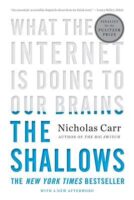The Shallows: What the Internet Is Doing to Our Brains by Nicholas Carr
My rating: 4 of 5 stars
After quite a bit of starts and stops I finally completed reading this book and I must say that while it did not enlighten me as much as I had hoped, I did enjoy reading it a lot. The 1st third of the book discussing how technologies (e.g. the clock, print, books) have affected humanity, society and productivity etc. is quite dry. While I do understand the reason for laying the foundations for what’s to come, it did feel draggy. Maybe it was just me re-acclimatizing myself to reading a book deeply after not doing it for awhile?
Anyway it gets much more interesting afterwards! Some things I picked up along the way:
– With the impermanence and update-ability of the digital book what does that say about the writer’s attitude towards the work (i.e. in achieving perfection) and the pressures imposed on completing it? By extension how does that shape our attitude towards writing an email/online posting versus a letter in the past?
– The Internet is an environment that inherently “promotes cursory reading, hurried and distracted thinking, and superficial learning”. It also encourages positive reinforcements (usually instantaneous) and commands our attention relentlessly. Click on those hyperlinks and do it more often!
– When engaged in deep reading our brains are in effect under-stimulated, as opposed to their over-stimulation when we go online. Is the latter an ideal state? He suggests not.
– The difference between good and bad distractions.
– The mistake of looking at the brain, memory and thinking as a computer, data storage and processing. Retrieving a thought from long term memory is not the same as retrieving a piece of data from storage.
– A clear overview of the workings of and relationships between short term, working and long term memories.
– By making things easier. more efficient and more user-friendly, it takes away the pressure on our brains’ working memory, supposedly for other more ‘useful’ business. It is actually making us more disengaged, less thoughtful, less reflective etc.
– Recognizing the value of attentiveness, note-taking and memorizing and how they are progressively being reduced/overlooked.
Towards the end of his observations and warnings the author offers a suggestion to begin reclaiming our ability to pay attention, strengthen our memory and improve cognition: quieten the mind (e.g. remove bombarding stimuli, take walks in peaceful surroundings, look at calming pictures). I particularly appreciate how he brings up examples and snippets of neuroscience research that highlight how the brain is affected by what we consistently subject it to (due to its plasticity) and how as we continue to use technology it is also reshaping us. Carr says that while technological progress and advances cannot be reversed (without adverse effects on civilization), he hopes that we “won’t go gently into the future our computer engineers and software programmers are scripting for us”. We have to be aware of what all this is doing to us and what we stand to lose, not just what we gain. This book has definitely given me useful things to mull over and bring up for discussion, especially in my role as an educator.

